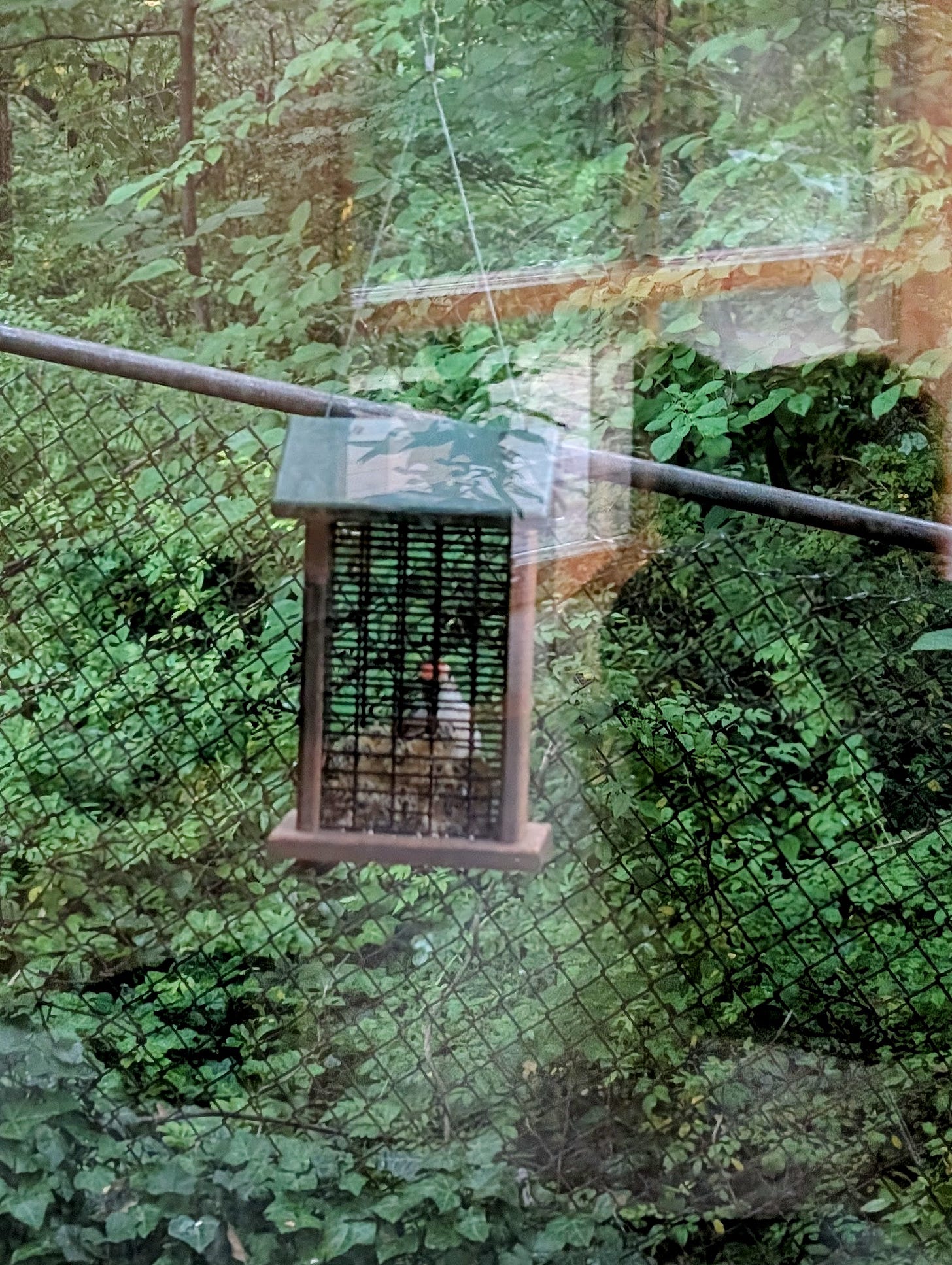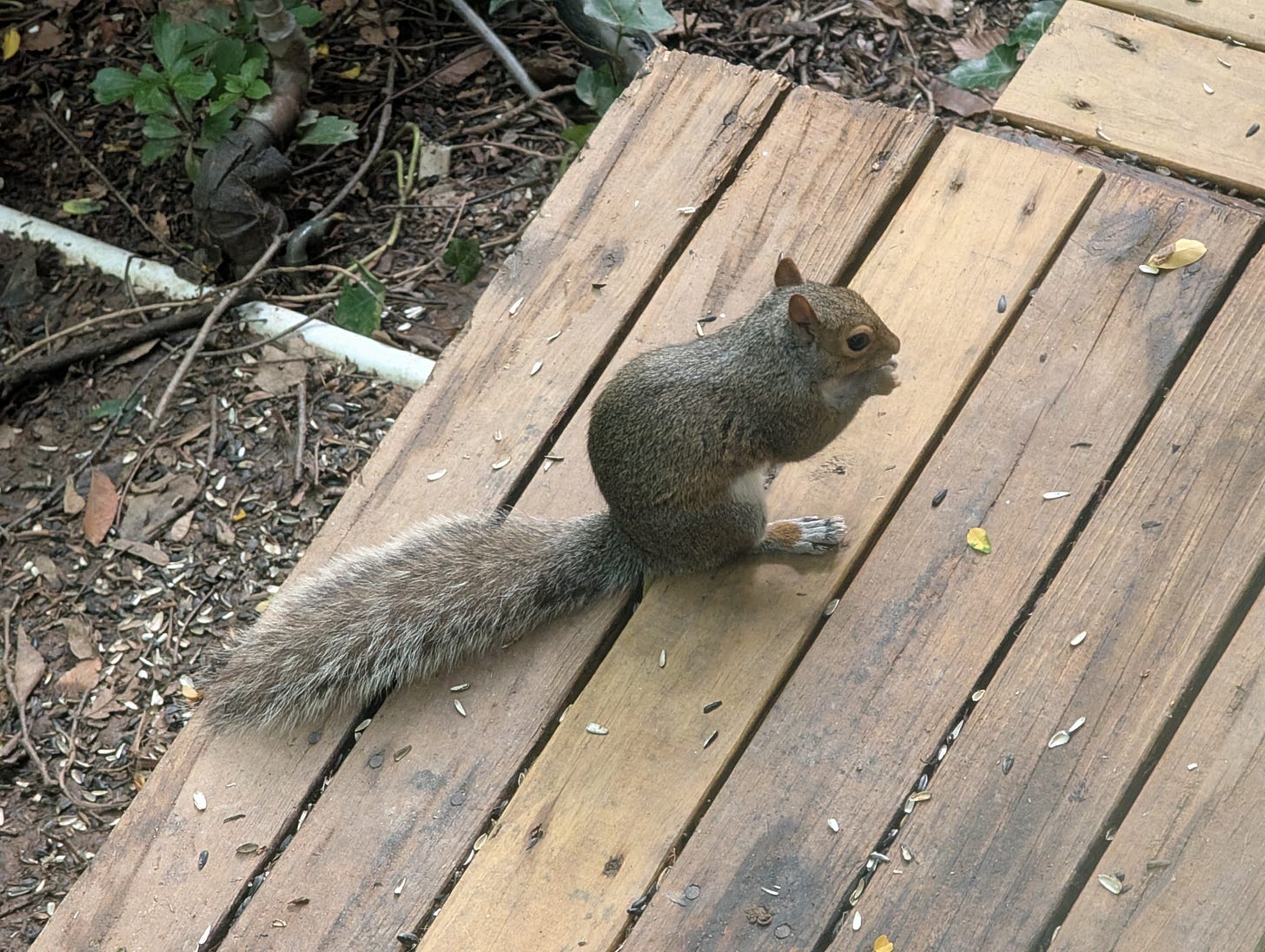The former residents of our home left behind three bird feeders. I cleaned and filled them, then sat by the window. Let the feast begin.
I am compensating birds to perform for me. Their job: to flutter, swoop, and sing on cue.
It's not that bad a deal. I provide premium feed, $15 per bag, at the local hardware store—quite the windfall for them.
Yet, while necessary, compensation immediately distorts the work-value equation. It introduces an imbalance that slowly shifts the focus from effort to reward, growth to mere "fat-catting," from agency to dependency. And because not all birds are created equally, I find myself judging their performance with a definite bias: I wish only red robins would dance for me.
In our search for windfalls, we're not so different from the birds. Compensation shapes our choices and ties us to routines, sometimes long after they stop serving us.
Remember your first check?
I was in college when I first got paid for work. As an international student, I was limited to working on campus, so I became a food server. I clocked in, I clocked out, and I hated everything about it until I got paid at the end of each week. The pay was low and, so it felt, was my value.
My first "professional" paycheck came several years later. My first journalism job, pinch me! I got paid to do work I loved. I interviewed high-profile political and cultural leaders, covered big natural and staged events (the SF earthquake in '89 and a Michael Jackson concert in xx), and dug into regular people's lives (Brazilian go-go dancers in Newark, immigrants in Canada, self-exiled millionaires in Miami). Starting salary 3K a month/36K a year. Wow.
Several raises and 10 years later, I was laid off. Found something else, more money, was laid off again. Found something else, more money, left of my own accord to join Google. Much more money, till I became too highly paid for a job that lacked scope for the salary I was receiving. Role eliminated.
Compensation and our working lives walk hand in hand. True for me and everyone else.
And not so much for birds, who fortunately get by with whatever they find out in the wild.
The Bird Feeder Effect: From Instinct to Expectation
Introduce a steady supply of high-quality seeds, and things shift, revealing some hidden aspects of our relationship with compensation.
Agency: From wild to dependent. These birds were pure entrepreneurs when the feeders were empty. There were fewer in my yard, and their job was survival. They foraged, hunted, and worked tirelessly for every meal. Now they just show up.
Competition: The Scarcity Mindset. There is fierce competition for too few perches. Big birds swoop in and get prime access. As the smaller ones get shut out, they're forced to learn new tricks.
Value: The Pursuit of More. Once the birds are accustomed to the idea that a feeder exists in my yard, they gorge beyond necessity. The feeders empty faster. My feed flow runs low. And as you know, feed-flow is king.
The Inevitability of Change: Houston, we have a problem. My husband notices birds flying into the windows as they position for access, and squirrels lining up on the fence, waiting for the scraps that litter the floor. He tells me the mice are surely just waiting in the wings.
As this cannot go on, he gives me two choices: move the feeders far away from the house (forcing me to go outside to enjoy my birds) or get rid of them altogether.
Untying the knot
The truth is, we always have more choices than seem immediately apparent.
My birds, who never knew there was a connection between their value to me and the full feeders, will be fine. I will give them extra food as I move them to the back of the garden. I will likely lose interest in the performance, and someday soon the feeders will be empty again.
Like the birds, we get attached to the feeder, the title, the paycheck, the “good enough” role. We mistake structure for safety. But even when change is forced on us—by a layoff, a buyout, a disappearing role—something different will eventually come up. But they don’t show up until we show up for ourselves.
Take buyouts, for example. We've seen lots of them recently—in the federal government as DOGE became a thing, at Google as the AI revolution takes hold (with many other tech companies about to follow suit), and at Stellantis as a need to cut costs.
Giving people the choice is great—the alternative, involuntary layoffs, is not.
Based on a study by Aon released in January, a massive 60% of employees across geographies are planning to jump ship this year as they look for more rewarding work than they are currently in.
And yet, choosing to let go ain't simple for all the reasons we've spoken about in so many of our previous essays: we are emotionally attached to our job, our job is too big a part of our identity, the future has never felt more uncertain, and loss aversion runs deep through our veins.
[K]Now You: Laying the Career Ladder Flat
"The career ladder" exists as an expression because it is a way to climb up. It can also be used to climb down. Or move laterally.
Like my birds at the feeder, climbing up the ladder requires competing harder and performing better, at the risk of becoming dependent on no longer nourishing rewards. Our value is determined by someone else's circumstances: their budget or their tolerance for a mess of birds, squirrels, and mice.
Eventually, something will change. It always does.
The further I move through the grief and anxiety of detaching from the identity I built around my compensation, the less I see my value as a dollar amount.
I've laid down the ladder horizontally, and I'm using it to move across a gap.
The transition to AI, the arrival of agentic assistants, and a changing world with so many urgent problems and bursting at the seams with discord and discomfort make the crossing scary as s**t.
Alas, I wish we all could fly off like my birds. Instead, we must cross this next stretch like a squirrel: careful not to fall but determined. And that might be just right, and enough, for now.








I needed to read this today. Thank you putting this confusing concept into words that are easier to connect to emotions. ❣️
zinho, legal. bom saber que o jardim, as arvores e os passarinhos te chamam a atencao. renard esta certo - ponha os feeders um pouquinho mais longe das janelas, para eles nao morrerem por causa do impacto. te amo